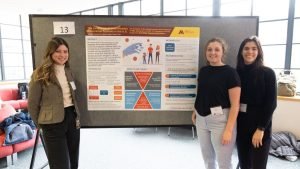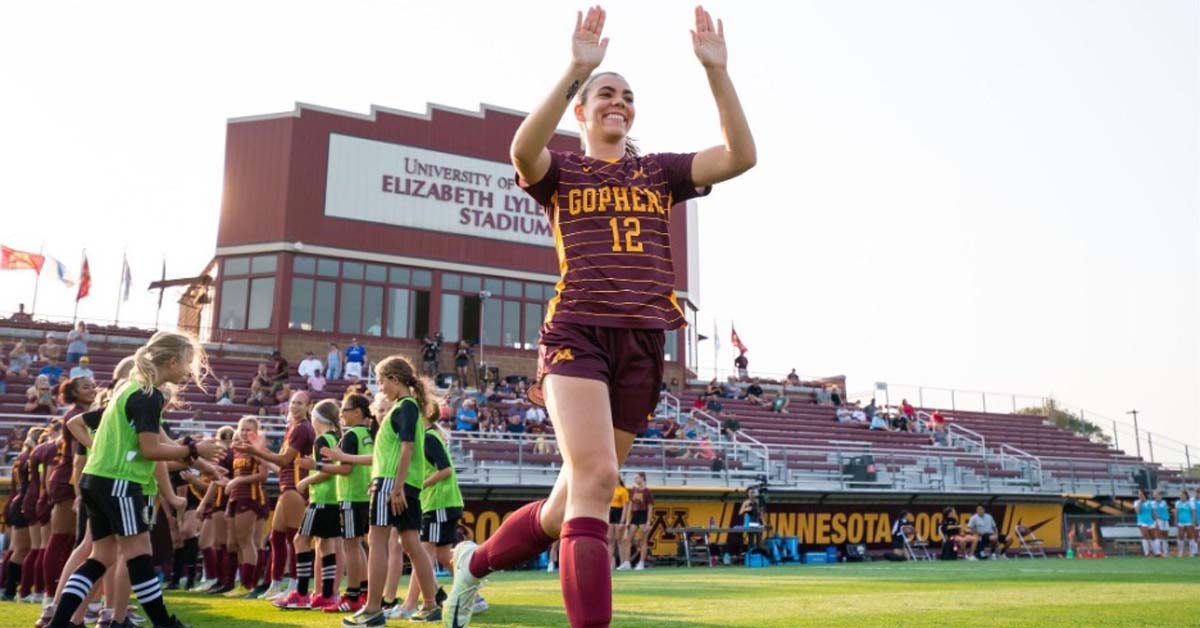"Minnesota was like a perfect storm: I could engage in rigorous research activities at a top school of public health while also playing on a Big Ten D1 stage."
First, I’d like to know a little bit about you as a person. Where did you grow up? Where did you attend undergrad and what was your degree/area of study? [Gabbie] I grew up in St. Charles, IL, which is a western suburb of Chicago. I attended Washington University in St. Louis, MO, where I studied biochemistry.
What drew you to public health? OR How did you become interested in public health? OR What was that moment in your life when you decided you wanted to study public health? [Gabbie] In undergrad, I knew I wanted to do something in the STEM field. I really thought I’d be super into research, but I also liked having a direct impact on people. That focus helped me decide on public health because it is about prevention and strategies for dealing with systemic issues, which lets me conduct research while also doing work that can lead to real change.

What specific issue, problem, or area of research in public health do you care the most about and why? [Gabbie] I care about increasing accessibility to healthcare. Whether that is access to primary care doctors or insurance, it has a huge impact on health, and we need to ensure that people can both seek out care and be able to afford it. We need to invest in the health and well being of all people.
How would you like to help address or explore this issue?[Gabbie] There are a lot of important proposed options that I think need to be explored, such as universal health coverage. I also think that we need to address access to people in geographically rural areas, as well as people from low-income backgrounds.
Are you currently involved in any public health research or professional work? [Gabbie] I recently worked at a medical cannabis company that was researching inequities in the state related to marijuana arrests and pushing for decriminalization. I am currently working at an organization called DIRA, which is a small, women-owned consulting company focused on healthcare and providing solutions in the field. I really value being a part of an organization that tries to improve health access and serve communities that have been under-invested and under-resourced.
Why did you choose to come to the U of M School of Public Health? [Gabbie] I made a list of my top-five, preferred schools for my graduate degree. I knew that I wanted to play soccer too, so I was hoping that it would work out with whatever school I chose. And Minnesota was like a perfect storm: I could engage in rigorous research activities at a top school of public health while also playing on a Big Ten D1 stage. Also, growing up in Illinois, the cold didn’t scare me! It’s been a great experience so far. My advisor, Jason Hill, has been a tremendous help; my team has been amazing; and my instructors have been flexible with my schedule. I’m very grateful for everyone’s support.
What has been your favorite class so far? [Gabbie] This is a tough one! My favorite class was Survey Research Methods (PUBH 6810) taught by Associate Professor Todd Rockwood, which is a course I ended up teaching as a graduate assistant. However, the best course I’ve taken was Associate Professor Ezra Golberstein’s Healthcare Systems and Public Health (PUBH 6724) because it gave such a comprehensive overview of the state of health in the U.S. What I learned in that course was incredibly applicable for my work.
What is your vision for an antiracist school of public health? [Gabbie] I think my vision for an antiracist school of public health is one that constantly puts in the work. It’s about developing that culture and environment from the ground up. The school needs to push the folds and understand new perspectives, while also teaching our students how to challenge our own biases and prejudices. There are so many ways to take on racism; targeting one area is not enough. Antiracism needs to bleed into everything we do and be involved in every decision we make.
What do you like about being in Minnesota? [Gabbie] One thing that I’ve noticed since moving here is that Minnesotans love Minnesota! There is state pride here more than anywhere else I’ve been. I feel like there is a deep loyalty and richness in the communities, the cities, and in the state. It has a special energy about it.

